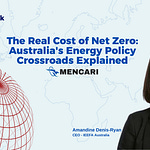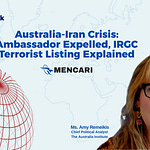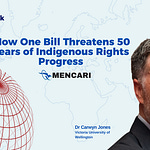When President Trump declared "Liberation Day" and slapped tariffs on 90 countries using emergency powers, he sparked a constitutional crisis that goes far beyond trade policy. Dr. Susan Stone from University of South Australia breaks down how a law designed for freezing terrorist assets is being stretched to impose massive trade taxes—and why the courts said "not so fast."
Think of it like this: imagine if your local mayor started making federal laws during a "city emergency." That's essentially what happened when emergency powers meant for national crises got used for everyday trade disputes. The result? A legal mess that's left businesses with million-dollar bills they can't plan for, supply chains grinding to a halt, and the entire global economy playing a waiting game that could last months.
This isn't just about economics—it's about the fundamental question of who gets to make the rules that affect what you pay for everything from your phone to your morning coffee.
Truth matters. Quality journalism costs.
Your subscription to Mencari directly funds the investigative reporting our democracy needs. For less than a coffee per week, you enable our journalists to uncover stories that powerful interests would rather keep hidden. No corporate influence. No compromises. Just honest journalism when we need it most.
Five Key Takeaways
Constitutional Collision: Courts ruled that tariffs under emergency powers (IEPA) are illegal because only Congress, not the President, has the constitutional authority to regulate commerce—a principle dating back to "no taxation without representation"
Massive Economic Impact: 50% tariffs on EU goods, 145% on Chinese products, and 10% on most other countries could eliminate entire trade relationships and cut US GDP by 0.8%
Legal vs. Illegal Tariffs: While emergency tariffs face court challenges, other tariffs under Sections 201, 232, and 301 remain legal because they follow proper Congressional approval processes
Business Paralysis: Companies are leaving goods in customs warehouses rather than paying uncertain tariffs, with one small business owner facing an unexpected $600,000 bill just to retrieve her inventory
Global Supply Chain Redesign: International businesses are actively reconfiguring supply chains to minimize US market exposure, potentially permanently reshaping global trade patterns
Detailed Synopsis
This episode explores the unprecedented intersection of constitutional law, emergency powers, and global trade policy through the lens of Trump's controversial "Liberation Day" tariffs. Host Mikko Santos interviews Dr. Susan Stone, Credit Union SA Chair of Economics at University of South Australia, to unpack one of the most significant trade law challenges in modern history.
The conversation begins with Trump's invocation of the International Emergency Economic Powers Act (IEPA)—legislation originally designed during World War I to control enemy investments and later used for sanctioning terrorist organizations and countries like Russia. Trump stretched this emergency framework to justify tariffs on 90 countries, citing the fentanyl crisis for Mexico, China, and Canada, and trade deficits for everyone else.
Dr. Stone meticulously explains the legal distinction between different types of tariffs. While emergency tariffs under IEPA face constitutional challenges, other tariffs imposed under Sections 201 (safeguard protection), 232 (national security), and 301 (unfair trade practices) remain legally sound because they follow established Congressional approval processes.
The constitutional principle at stake traces back to America's founding grievances about "taxation without representation." The courts ruled that Congress, not the President, holds authority over commerce regulation—making Trump's emergency tariff approach constitutionally problematic.
Real-world impacts emerge through vivid examples: a small business owner suddenly owing $600,000 for goods in customs, 12 states arguing tariffs impair their ability to provide public services, and businesses globally redesigning supply chains to avoid US market volatility.
The discussion reveals how legal uncertainty creates economic paralysis. With appeals potentially reaching the Supreme Court over months, businesses face impossible planning scenarios. Investment is declining across sectors, the Federal Reserve fears stagflation, and even if emergency tariffs are ruled illegal, Trump retains other legal avenues for tariff implementation.
The episode concludes by examining how trading partners worldwide are factoring judicial uncertainty into their economic planning, with countries like Canada actively diversifying away from US markets toward the EU and UK.
What Readers Will Learn
Constitutional Law Foundations: Understanding how America's founding principles about taxation and representation directly impact modern trade policy and why separation of powers matters in global commerce.
Trade Policy Mechanics: The difference between emergency powers (IEPA) and legitimate tariff processes (Sections 201, 232, 301), and why these distinctions determine what's legal and what's not.
Economic Impact Assessment: How to interpret the real-world effects of trade policy uncertainty, from individual business cash flow crises to GDP-level economic projections.
Global Supply Chain Dynamics: Why businesses are permanently restructuring international operations and what this means for future trade relationships and consumer prices.
Legal Risk Management: How judicial uncertainty affects business decision-making and why companies are choosing supply chain diversification over waiting for court resolutions.
Investment Strategy Implications: Understanding how trade policy volatility influences market performance, with the US stock market underperforming globally due to tariff uncertainty.
This is not a sponsored video/audio. A small commission will be paid to us if you purchase anything through some of the affiliate links in our product listings.
If you want to chat more about this topic, I would love to continue this conversation with you, over Twitter @realmikosantos!
This podcast is powered by Kangaroofern, Australia's Independent Podcast Management Company.
Thanks so much for listening to our podcast!
If you enjoyed this episode, be sure to subscribe so you'll be notified when a new episode is posted in the Apple podcast, Google podcast, Spotify, Stitcher or via RSS.
If you think others could benefit from listening, please share it on your socials.
You can also subscribe to the podcast app on your mobile device.
If you found value in this episode, leave us an Apple Podcast review. Ratings and reviews from our listeners are extremely valuable to us and greatly appreciated. They help our podcast rank higher on Apple Podcasts and expose our show to more awesome listeners like you.
This is a premium episode. If you would like to discuss this with other subscribers or get access to the episodes, visit Readmencari.com
Got a News Tip?
Contact our editor via Proton Mail encrypted, X Direct Message, LinkedIn, or email. You can securely message him on Signal by using his username, Miko Santos.
While mainstream media serves corporate interests, you deserve the truth.
Your Podwires subscription—less than a coffee per week—powers real independent journalism. Our reporters dig into the stories powerful people desperately want buried. No corporate masters. No political handlers. Just the uncomfortable truths that matter most right now.
This is journalism without compromise, funded directly by readers who refuse to be misled. If this reporting opened your eyes, hit Restack so others can see what they're missing.
Not ready to be paid subscribe, but appreciate the newsletter ? Grab us a beer or snag the exclusive ad spot at the top of next week's newsletter.










